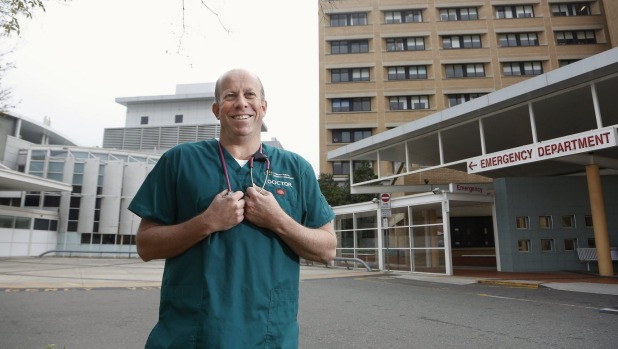
The departing boss of the Canberra Hospital emergency department has praised the work of doctors who treated a record number of patients this year.
Dr Michael Hall, who completed his final duties as clinical director this week, said he was proud of the department’s training culture but said doctors needed to better support each other.
His resignation was not linked to a damning review of hospital training processes at Canberra Hospital and his departure was internally announced late last year.
During his tenure, the number of presentations to the south side department increased by 22 per cent with staff now treating an average of 357 patients a day.
“We get close to 130,000 presentations a year so roughly a third of Canberra has turned up to the emergency department and despite the perception they will wait, we provide quality care,” he said.
Numerous reports have found waiting times at Canberra emergency departments are among the worst in Australia, with staff not immune to media attention.
“Timeliness is often seen as the only way to measure the performance of an emergency department and that pressure is felt by the staff, despite the patients receiving excellent care,” Dr Hall said.
Dr Hall said those presenting to the hospital were not always appreciative of the services doctors and nurses performed, or willing to wait for treatment.
“In an emotional sense perhaps they don’t [appreciate us] although I don’t ask them to,” he said. “I ask them to be patients and I ask we provide them with good care and look after them.
“We only have limited number of beds and staff and that’s a unique challenge that some people enjoy, but it does create some stress and tension in the department.”
Dr Hall, who will return to a clinical role later this year, said commitments to education and training had become integral part of the emergency department culture.
He acknowledged that a KPMG training review found bullying and harassment existed in the hospital, but stressed the emergency department had a strong and supportive culture.
“That’s partly due to the nature of the emergency department as we are working with doctors of every level on the floor,” he said.
“Many patients are seen by very junior doctors who then have discussions with more senior doctors as part of practice and education.”
Dr Hall said said the medical profession was often tempted to judge performance based solely on clinical skill and experience.
“We also need to judge how well we support and teach our colleagues as that is just as important and something that medicine needs to learn,” he said.
Dr Hall said emergency department clinicians were a particular breed of doctor and said the hospital had an obligation to train future staff.
“We could be the most effective emergency department in Australia but if we neglected training then we would not fulfil our obligations to future generations,” he said.
“It is an integral part of what we do.”
Mr Hall said he was eager to continue working as a doctor in the hospital and admitted the administrative nature of the director role was intense.
“I’ll be having five months off and that’s the first major break I’ve had since my daughter was born seven years ago.”
